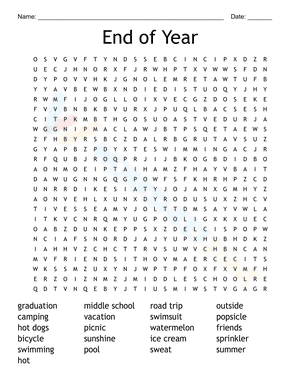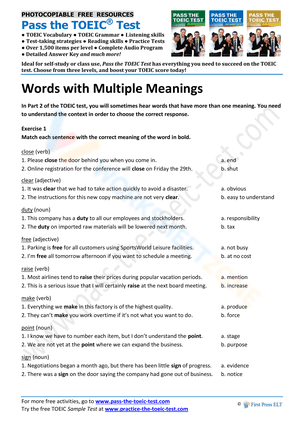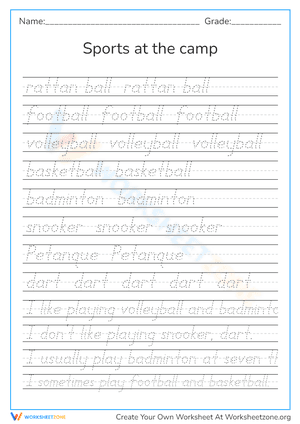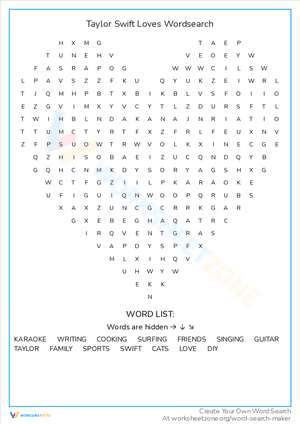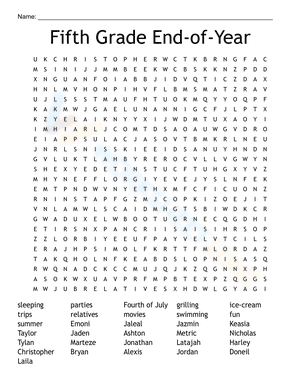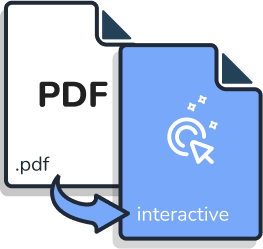Vocabulary is a very important aspect of learning a language. The difference between a phrase that is dull and one that demonstrates literary brilliance may sometimes be found in the writer's vocabulary and their ability to properly use that knowledge. On the other hand, increasing one's vocabulary is a job that many pupils would rather not have to go through. However, this does not have to be the case because of the development of vocabulary worksheets.
Vocabulary worksheets are designed to engage and assist your child as they build their vocabulary and proceed toward literacy development. These vocabulary worksheets can range from entertaining word searches, scrambles, and crossword puzzles to learn how to use contextual clues as well as other strategies to determine the meaning of words.
Worksheets for Vocabulary are perfect for use in the classroom or at home to supplement and increase vocabulary around any learning subject, such as wildlife, athletics, civil liberties, historic personalities, and more.
Why It is Important to Learn Vocabulary from an Early Age?
It is never too soon for an individual to get started developing and improving their vocabulary. Increasing vocabulary is an excellent method to improve the chances of being successful in many aspects of life, including personal and professional life. It is a popular misconception that you only have to learn a broad range of vocabulary once in your entire lifespan, and that is to prepare for the SATs.
The following is a list of the most significant reasons why it is essential to establish a robust vocabulary from a young age:
Build Retention
Children have a greater chance of maintaining an advanced vocabulary into adulthood and using the words they learned during their childhood in their day-to-day lives. It is essential that children learn the etymologies of words from a young age so that they can retain an understanding of the meaning of the word as they become older. When children start learning new words at a younger age, such words are more likely to get ingrained in their natural speech patterns.
Test Preparation Readiness
At the middle school and high school levels, vocabulary is evaluated much too seldom; then, all of a sudden, children are expected to know them for the critically crucial component of the SATs that is devoted to reading comprehension. Beginning to improve your vocabulary when you are in the fifth grade will help you avoid the stress of preparing for the SATs and other timed, vitally important examinations later on. Use flashcards, illustrations, and word games to turn to learn new words into an enjoyable activity.
Every Day, Everywhere
Starting early on in childhood to work on expanding your vocabulary can practically prepare you for life. Words that are often seen on the SAT may be found in a variety of daily contexts, including movies, video games, the workplace, and school.
As children become older, they will realize the importance of being able to communicate effectively and comprehend the many diverse environments they are exposed to. They will be able to navigate through any new environment more easily, and at the same time, they will feel better about themselves if they have a robust vocabulary.
College-Ready
A sophisticated vocabulary is an essential tool that can assist you in becoming college-ready and equip you for academic tasks such as articles and paperwork. If you have a large vocabulary, you will be able to articulate your concepts, opinions, and ideas in a manner that is clearer and more concise. It will also assist you in writing a successful college essay that will set you apart from the rest of the applicants while you are in the process of applying to colleges.
Impress for Success
The first thing you must accomplish if you desire to be successful in your career is to create a positive first impression. Your ability to convey your ideas and thoughts will significantly improve in proportion to the breadth and depth of your vocabulary.
Your ability to select your words with better accuracy can serve you well throughout your life in settings such as job interviews, professional environments, and personal interactions, among other places. If you have a more sophisticated vocabulary than your competition, you will probably have an easier time convincing them to choose you for the fantastic job.
Improve Memory and Learning Ability
Because your brain is still maturing and evolving, beginning the process of learning a language while you are younger might be beneficial. Learning from a young age, in particular, can aid boost memory abilities later in life while learning more in school or university when children will be required to retain knowledge for tests and examinations.
This will also place your kid in an excellent position for acquiring the ability to read and write since many aids employ learning new languages to assist children to learn their original language. You may use this to your advantage by teaching your child a second language.
Benefits of Using Vocabulary Worksheets
There are many different activities that go into developing a robust vocabulary. Incidental chances of improving one's vocabulary may be found in activities such as reading on a regular basis, seeing films, and engaging in conversation practice with friends. Students, however, will also benefit from spending some of their time intentionally learning new terms and phrases.
Vocabulary worksheets are one of the most common approaches to purposeful vocabulary acquisition. These worksheets have the benefit of offering excellent materials that may assist students in becoming familiar with new lexis.
Recall
For a word to be helpful, one must be able to retrieve it from memory. When it comes to ensuring that newly acquired vocabulary is properly retained, vocabulary worksheets are quite beneficial. Learners may choose which vocabulary items on the word list need further in-depth study by putting themselves to the test with vocabulary worksheets.
They are able to monitor their own improvement and focus their limited study time on the concepts and vocabulary items that need the most work.
Personalization
One of the most essential things that students can do to ensure that new vocabulary stays in their heads is to make connections between the words they are learning and the people, places, and things that are meaningful to them. In a similar vein, it is important for students to learn the terms that have the greatest bearing on their everyday lives rather than the other way around. The production of fresh, individualized worksheets for vocabulary study is an essential responsibility.
Students may build their own word lists using different sorts of vocabulary workbooks and then designate those word lists as public so that others can use them. Students have the opportunity to pick up a new language from their peers all across the world thanks to this method!
Multimedia
Students get extra help for their learning in the form of pictures and audio. The tests that are included in the vocabulary worksheets include both letters and images in them to assist students with their vocabulary recall and to ensure that kids are able to identify not just the written form of new words, but also how they sound.
Currently, students can do the worksheets offline (downloaded and distributed in class) or online (right on websites). Hence, it is so convenient for students to learn vocabulary in diverse media thanks to the development of vocabulary worksheets.
Systematicalization
Vocabulary worksheets are also essential since they provide a distinct place of departure. Learners are typically aware that they need to enhance their vocabulary, but they are unsure of how to get started. On the other hand, instructors may not concentrate on vocabulary in any way other than in an incidental (or accidental) manner, such as when learners come across difficult terms in a book.
Vocabulary worksheets not only offer students and instructors a list of words that can be worked through in a methodical manner, but they also provide students and teachers the ability to pick which terms in a text merit extra attention, such as academic words.
How to Use Vocabulary Worksheets in the Classroom?
Now that we've shown the value of acquiring vocabulary via the use of vocabulary worksheets, let's talk about how you might use this strategy in the classroom. Let's imagine that when your students are working on a reading assignment in the classroom, you want to find out what kind of terminology they are having trouble with.
Why not suggest to your pupils that, as they read the passage, they keep a list of the terms in the passage that they are having trouble understanding? After that, have your students take turns reading out loud one word, then have the whole class complete vocabulary worksheets together. You may give the students in your class a test using the new vocabulary worksheets as a quick and easy exercise.
This is going to be a short session on vocabulary, but it will be dynamic and informative, and it will definitely help your pupils remember the terminology.
Vocabulary Worksheets for Revision or Homework
Vocabulary worksheets are, of course, an excellent educational resource for other settings outside the classroom. Vocabulary worksheets may be assigned to students as homework, or students can use them to review previously learned material. You should encourage your pupils to make vocabulary worksheets using difficult vocabulary that they have learned in the classroom and then give them to them as part of their homework so that they may test themselves at home.
When they are preparing for in-class examinations or bigger exams, they may go back to the vocabulary worksheets they were given. These English Language Arts worksheets will be customized to address the specific challenges faced by each student, and as a result, this vocabulary resource will be of the highest possible value.
You could either make your own vocabulary worksheets and provide the URL to your students, or you could download and print the word list for them to study at home. Share, for instance, a word list that is similar to the vocabulary worksheets titled "words about travel" in the event that your subsequent class will focus on the language that is used while traveling. To get ready for the next class, your students may study this vocabulary on their own time and use it as a resource.
Tips to Optimize the Usage of Vocabulary Worksheets
Encourage children to find out more words
Make sure that kids don't feel ashamed while trying to figure out the meaning of unfamiliar words, whether they ask you for the meaning, try to figure it out themselves by investigating the context of the phrase, or look it up in a dictionary. If they ask you to explain a new term, take the time to do so, or investigate the meaning of the word together with enthusiasm. When someone shares a new term with you, show that you are interested in it and delighted by it.
Create new word pictures
You and your kid may sketch a setting that depicts the term "reluctant" for them, such as a picture of them eating Brussels sprouts. This will help them remember the meaning of the word and make it easier for them to use it in the future.
Do not introduce your children to too many words one time
Introduce a modest amount of new terms at a time, such as up to seven new words per week, allowing the entire family to subsequently slip into the discussion as smoothly as possible.
Maintain regular communication
It is common knowledge that stimulating discussions between parents and children is one of the primary variables that contribute to the development of a child's vocabulary.
You don't need to talk about anything particularly interesting; if you find yourself at a loss for words, just describe your typical day at home, or even draw inspiration from previous family vacations. When you go farther afield, whether you're going to a shop, a museum, or getting on a train, speak about what you see and experience and keep an eye out for new terms on signs and labels.
Put the new words into their proper context
Your kid will find it far simpler (and more enjoyable) to learn a word when it is presented to them in the context of a meaningful phrase (whether that sentence is heard or read), rather than when the word is presented to them in isolation or as part of a list. If you were to say, for instance, that a coworker who had just said goodbye to their pet was despondent, the circumstances surrounding their loss should make it easier for them to comprehend what you meant.
Position a word in different scenarios
When you "drop" a new word into a discussion with your kid, attempt to use that term in a variety of contexts so that they may better comprehend what you mean. For instance, if your child has picked up on the word "fortunate," you could say things like, "You're fortunate you're part of such a kind family," and then a little while later, you could say things like, "You're fortunate the supermarket hasn't run out of bread despite the fact that it's late in the day."
You might also offer them an example of how you would use the word and then ask them to give you one of their own: for instance, you could say that you felt euphoric when your kid was born, while your child may describe themselves as feeling ecstatic during their birthday celebration.
Repeat as much as possible
A youngster has to be exposed to a new word several times before the meaning of the term is permanently ingrained in their brain. The number of times a youngster needs to hear a new word before it is actually added to their vocabulary and so committed to their long-term memory ranges anywhere from four to twelve, according to the majority of the experts who have studied the subject.
Read it loud
Reading to your kid, regardless of whether or not they are an accomplished reader, enables them to comprehend more difficult material than they would be able to read on their own. This not only introduces them to terms with a higher level of difficulty but also opens the door for dialogue between the two of you.
Encourage your children to search for the roots of words
If your kid does not comprehend the term "audible" in the phrase, for example, "Lily was scarcely audible," think of other words with the root "aud" that your child is familiar with, such as "audio" and "audience." Your youngster will be better able to comprehend the concept that the term refers to hearing and recognize that the phrase is describing how Lily is speaking in a very soft voice as a result of this.
Define a term by using its synonyms
If your kid doesn't know a term and you're reading or chatting together and it comes up, rather than stopping the flow of the conversation to explain the word, you may provide a concise explanation in the form of a synonym (e.g. bereft – that means losing something). Then, after the discussion or chapter is through, be sure to bring up the word again, repeating it aloud and pointing to it in the text if it's being read from a book so that they may get used to the way it sounds.
In the same vein, using a thesaurus may be beneficial since it provides a variety of synonyms as well as antonyms (words that signify the opposite of one another), which can be used to contrast ideas. They may also be effective in creative writing since they help prevent the author from overusing the same term again.
Final Words
Learning vocabulary is always considered a fundamental task, although it encompasses a wide variety of subject areas. For the purpose of assisting your student in enhancing their vocabulary abilities, we have produced a variety of practice tasks. You'll also be able to locate worksheet activities centered on the homophones, synonyms, alphabet, phonetics, antonyms, homographs, prefixes, adages, suffixes, proverbs, and homographs!
Every one of the printable vocabulary worksheets at Worksheet Zone is based on the common core standards, and they span a wide variety of ability levels, beginning with kindergarten and going all the way up to high school. To assist students in developing their academic vocabulary, the vocabulary worksheets we provide include a wide variety of activities, such as games, riddles, lexicon cards, reading comprehension excerpts, drawings, and infographics. You are welcome to print versions for use in your lecture hall or at home.
